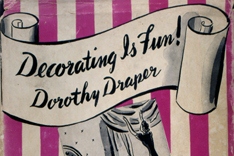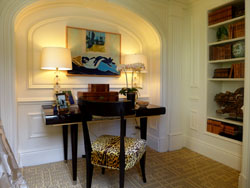mood board: Georgian style
 Alexia Rossetti
Alexia Rossetti  Wednesday, February 6, 2013 at 10:00AM
Wednesday, February 6, 2013 at 10:00AM  (BBC's Downton Abbey / Highclere Castle - Drawing Room)With the popularity of the British show, Downton Abbey, interest naturally sparked in English country estates and their beautiful interiors. Downton Abbey is the fictional setting of the very real Highclere Castle, home of the Earls of Carnarvon, in Hampshire, England. To pay homage to the incomparable English style and to continue our series of mood boards, we’re delving into one of their most popular styles: the Georgian period.
(BBC's Downton Abbey / Highclere Castle - Drawing Room)With the popularity of the British show, Downton Abbey, interest naturally sparked in English country estates and their beautiful interiors. Downton Abbey is the fictional setting of the very real Highclere Castle, home of the Earls of Carnarvon, in Hampshire, England. To pay homage to the incomparable English style and to continue our series of mood boards, we’re delving into one of their most popular styles: the Georgian period.
The Georgian style was named of course for the reigning British monarchs of the 18th century, George I through George III. The most famous cabinetmaker to emerge from this period was Thomas Chippendale. The Early Georgian period was really an extension of the earlier Queen Anne style and their hallmark feature in furniture was the cabriole leg. Cabinetmakers just added more sculptural detail to the leg, such as eagles, lions, and satyrs. Chippendale then entered the scene and refined the furniture lines and gave Georgian furniture a more graceful form.

In our Georgian mood board, we have fine examples of Chippendale furniture, such as the Chippendale settee from Agostino and an upholstered wing chair in mahogany from the Stanley Weiss Collection. Both have the distinctive cabriole legs and ball and claw foot with scroll detail at the knee.
Tea drinking also entered the English culture in the early 18th century and all kinds of furnishings devoted to this habit arose. On our board is an elegant mahogany Chippendale tea table from Clinton Howell Antiques. Beautiful ceramics in the form of teapots and teacups also became popular. We have here an enameled teapot from Vandekar and a Royal Worcester teacup set.
Chinese trade spurred the import of porcelain ware. An English drawing room was not considered complete without some kind of exotic Chinese accessory. Complementing our Georgian room is a turquoise glazed Mandarin Palette vase from the Qing Dynasty. Cartouches depicting Chinese figures in a garden setting grace the front. Handles in the shape of Rouge de Fer dragons add to the exotic detail. The vase is available from Vallin Galleries.
Portraits were a popular form of art work during this time and the subjects usually stood in front of their estate or some kind of classical folly or ruin. Our painting here is by artist John Lewis of Mrs. Yeats in front of a fantasy Greek temple.
In our photo above of the drawing room at Highclere Castle, there is a mixture of different styles – as each generation of the Carnarvon family changed and added to the furnishings. The sofa is most likely from the early 20th century but the armchairs may have been of the Georgian period but they could also just be reproductions.
Interested in learning how to create mood boards? Take a look at Sheffield School's Complete Course in Interior Design. At Sheffield, you will learn how to transform a space, create color schemes, and select furniture, lighting, and accessories.


